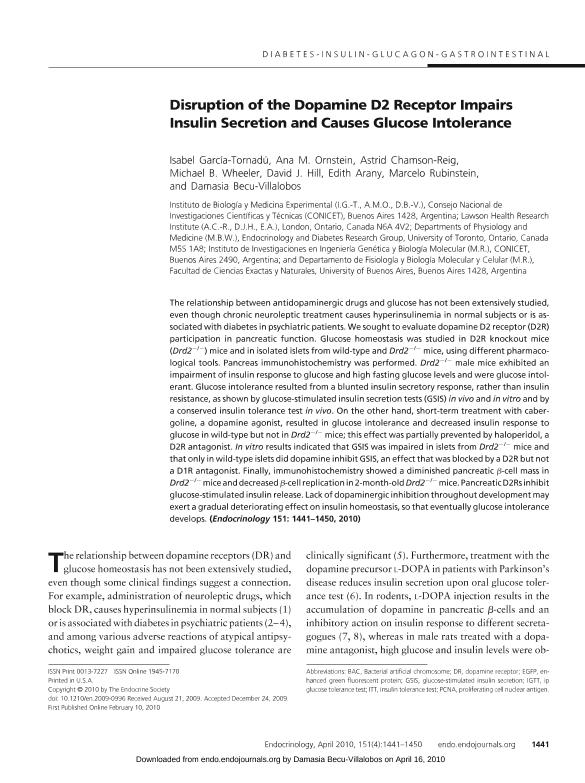Artículo
Disruption of the dopamine D2 receptor impairs insulin secretion and causes glucose intolerance
Garcia Tornadu, Isabel Andrea ; Ornstein, Ana Maria
; Ornstein, Ana Maria ; Chamson Reig, Astrid; Wheeler, Michael B.; Hill, David J.; Arany, Edith; Rubinstein, Marcelo
; Chamson Reig, Astrid; Wheeler, Michael B.; Hill, David J.; Arany, Edith; Rubinstein, Marcelo ; Becu, Damasia
; Becu, Damasia
 ; Ornstein, Ana Maria
; Ornstein, Ana Maria ; Chamson Reig, Astrid; Wheeler, Michael B.; Hill, David J.; Arany, Edith; Rubinstein, Marcelo
; Chamson Reig, Astrid; Wheeler, Michael B.; Hill, David J.; Arany, Edith; Rubinstein, Marcelo ; Becu, Damasia
; Becu, Damasia
Fecha de publicación:
04/2010
Editorial:
Oxford University Press
Revista:
Endocrinology
ISSN:
0013-7227
e-ISSN:
1945-7170
Idioma:
Inglés
Tipo de recurso:
Artículo publicado
Clasificación temática:
Resumen
The relationship between antidopaminergic drugs and glucose has not been extensively studied, even though chronic neuroleptic treatment causes hyperinsulinemia in normal subjects or is associated with diabetes in psychiatric patients. We sought to evaluate dopamine D2 receptor (D2R) participation in pancreatic function. Glucose homeostasis was studied in D2R knockout mice (Drd2(-/-)) mice and in isolated islets from wild-type and Drd2(-/-) mice, using different pharmacological tools. Pancreas immunohistochemistry was performed. Drd2(-/-) male mice exhibited an impairment of insulin response to glucose and high fasting glucose levels and were glucose intolerant. Glucose intolerance resulted from a blunted insulin secretory response, rather than insulin resistance, as shown by glucose-stimulated insulin secretion tests (GSIS) in vivo and in vitro and by a conserved insulin tolerance test in vivo. On the other hand, short-term treatment with cabergoline, a dopamine agonist, resulted in glucose intolerance and decreased insulin response to glucose in wild-type but not in Drd2(-/-) mice; this effect was partially prevented by haloperidol, a D2R antagonist. In vitro results indicated that GSIS was impaired in islets from Drd2(-/-) mice and that only in wild-type islets did dopamine inhibit GSIS, an effect that was blocked by a D2R but not a D1R antagonist. Finally, immunohistochemistry showed a diminished pancreatic beta-cell mass in Drd2(-/-) mice and decreased beta-cell replication in 2-month-old Drd2(-/-) mice. Pancreatic D2Rs inhibit glucose-stimulated insulin release. Lack of dopaminergic inhibition throughout development may exert a gradual deteriorating effect on insulin homeostasis, so that eventually glucose intolerance develops
Palabras clave:
Dopamine
,
Insulin
,
Glucose
,
D2
,
Diabetes
Archivos asociados
Licencia
Identificadores
Colecciones
Articulos(IBYME)
Articulos de INST.DE BIOLOGIA Y MEDICINA EXPERIMENTAL (I)
Articulos de INST.DE BIOLOGIA Y MEDICINA EXPERIMENTAL (I)
Articulos(INGEBI)
Articulos de INST.DE INVEST.EN ING.GENETICA Y BIOL.MOLECULAR "DR. HECTOR N TORRES"
Articulos de INST.DE INVEST.EN ING.GENETICA Y BIOL.MOLECULAR "DR. HECTOR N TORRES"
Citación
Garcia Tornadu, Isabel Andrea; Ornstein, Ana Maria; Chamson Reig, Astrid; Wheeler, Michael B.; Hill, David J.; et al.; Disruption of the dopamine D2 receptor impairs insulin secretion and causes glucose intolerance; Oxford University Press; Endocrinology; 151; 4; 4-2010; 1441-1450
Compartir
Altmétricas



